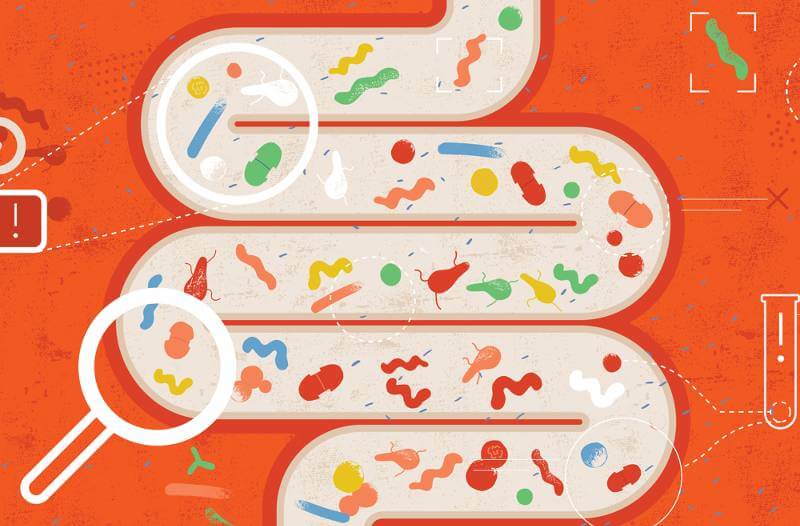The trillions of microbes living in your gut may hold the key to slowing down the aging process, according to new research. Scientists have found compelling evidence that these tiny organisms significantly impact how your DNA ages and potentially determine how well you’ll age overall.
A comprehensive review published in Exploratory Research and Hypothesis in Medicine has shed light on the intricate relationship between gut bacteria, DNA stability, and telomeres – the protective caps at the end of chromosomes that shorten as we age.
The research, conducted by scientists Swarup K. Chakrabarti and Dhrubajyoti Chattopadhyay, explains how imbalances in gut microbiota can accelerate two critical aging processes: genomic instability (accumulated DNA damage) and telomere attrition (the shortening of chromosome ends).
The Microbiome-Aging Connection
When our gut microbiome becomes unbalanced – a condition called dysbiosis – it triggers a cascade of harmful effects throughout the body that can accelerate aging at the cellular level.
Think of it like this: a healthy microbial community is like a well-functioning neighborhood watch that helps maintain order. When troublemakers move in, they not only cause local disturbances but also send ripple effects throughout the entire community.
In your body, this microbial imbalance creates system-wide inflammation and oxidative stress, both of which damage DNA and accelerate the shortening of telomeres – essentially speeding up your biological clock.
How Bacteria Influence Your DNA
The review reveals several specific mechanisms through which gut bacteria affect genomic stability:
- Some bacteria, like Helicobacter pylori and Fusobacterium nucleatum, produce toxins that directly damage DNA
- Harmful bacteria trigger chronic inflammation, which generates DNA-damaging molecules called reactive oxygen species
- Microbial imbalances disrupt bile acid metabolism, creating compounds that can break DNA strands
- Dysbiosis weakens the body’s natural DNA repair systems, allowing damage to accumulate faster
Meanwhile, beneficial gut bacteria produce short-chain fatty acids (SCFAs) that help protect DNA integrity and maintain telomere length, potentially slowing the aging process.
What Can We Learn From Centenarians?
One of the most fascinating aspects of the research examines the gut microbiomes of people who live to 100 years or beyond. These centenarians appear to host unique microbial communities that may contribute to their exceptional longevity.
Studies of centenarians from regions like Okinawa, Italy, and Sardinia reveal microbiomes rich in beneficial bacteria such as Akkermansia muciniphila, Faecalibacterium prausnitzii, and Bifidobacterium – all associated with reduced inflammation and better metabolic health.
A particularly striking finding came from a study of 1,575 people in China, including 297 centenarians. These exceptionally long-lived individuals maintained microbiomes similar to those of much younger people, with greater diversity and fewer potentially harmful bacteria.
The Telomere Connection
Telomeres – often compared to the plastic tips on shoelaces – protect the ends of chromosomes and naturally shorten with age. When they become too short, cells stop dividing or die, contributing to aging and age-related diseases.
The review highlights how gut microbes influence telomere length through several pathways. When dysbiosis occurs, it increases inflammation and oxidative stress, which accelerate telomere shortening. Conversely, a balanced microbiome helps maintain telomere length through anti-inflammatory effects.
Could this explain why people with more diverse gut microbiomes tend to have longer telomeres and better overall health? The evidence increasingly suggests so.
The Future of Microbiome-Based Anti-Aging Strategies
What makes this research particularly exciting is its potential to transform how we approach aging and age-related diseases. If the microbiome significantly influences how quickly we age, it offers a promising target for interventions.
Several approaches are already being explored:
- Dietary modifications to promote beneficial bacteria
- Probiotic supplementation to restore microbial balance
- Fecal microbiota transplantation to reshape gut communities
- Medications that target inflammation caused by microbial imbalances
Early clinical trials with anti-inflammatory agents, the diabetes drug metformin, and experimental microbiome therapies show potential for improving genomic stability and maintaining telomere length.
The Bigger Picture
How might understanding the microbiome-aging connection change our approach to health and longevity? For one, it reinforces the idea that aging isn’t simply a matter of time passing but rather a complex biological process influenced by many factors – including the microbes that call our bodies home.
This research also suggests that seemingly unrelated health practices – like eating a diverse, fiber-rich diet or avoiding unnecessary antibiotics – may have profound effects on how well we age by nurturing beneficial gut bacteria.
As our population continues to age, insights from this field could help more people not just live longer but remain healthier throughout their later years. After all, what good is extending lifespan if those extra years aren’t healthy ones?
In the words of the review authors, the microbiome emerges as a “master regulator of aging,” offering “transformative potential to mitigate age-related decline, paving the way for healthier, longer lives.”
If our reporting has informed or inspired you, please consider making a donation. Every contribution, no matter the size, empowers us to continue delivering accurate, engaging, and trustworthy science and medical news. Independent journalism requires time, effort, and resources—your support ensures we can keep uncovering the stories that matter most to you.
Join us in making knowledge accessible and impactful. Thank you for standing with us!

